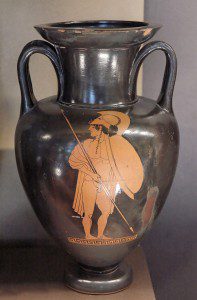
(Wikimedia Commons)
Click to enlarge.
Click again to enlarge further.
Compare Mark 13:34; Luke 19:11-27
The word talent (Latin talentum, from the ancient Greek τάλαντον [talanton], meaning “scale,” “balance,” or “sum”) originally referred to a denomination of money or, more precisely, to a weight of metal. Homer, for instance, knew the concept, and tells how Achilles gave a half-talent of gold to Antilochus, son of Nestor, as a prize for a chariot race (Iliad 23.784).
Thereupon, it comes to refer to the value of that weight of metal. It’s only later that, based on the parable in Matthew 25, it begins to be used metaphorically to denote an aptitude or natural ability — which is almost the only way that we use it today.
Few people, I suspect, realize that, when they refer to a “talented pianist” or announce that “Britain’s got talent,” they’re making a biblical allusion. But they are.










